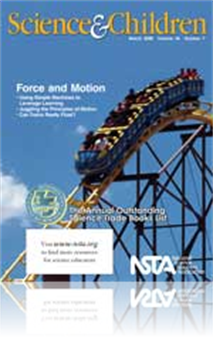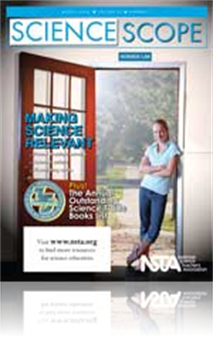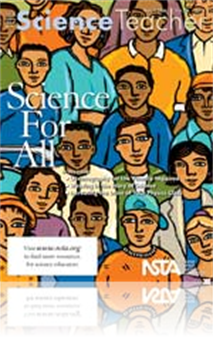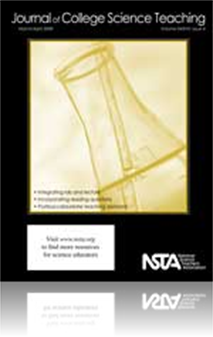All Resources
Journal Article
Methods and Strategies: Students as Authors
Are you looking for ways to effectively integrate—and assess—science and literacy learning? Try having your students create their own books! The Integrated Science Literacy Enactments (ISLE) approach to teaching and learning science is one way to...
Journal Article
Science Sampler: Making science relevant with an integrated curriculum
This article describes a modular middle school curriculum that integrates science, math, social studies, and language arts. An adventure story creates the context for student learning of the academic content, which is made relevant to students by inc...
Journal Article
Teaching Through Trade Books: Roller Coasters!
Students of all ages are fascinated by the ups, downs, loops, and twists of roller coaster rides! What they may not realize is that there is a lot of science involved in making a roller coaster work. This month’s column puts students in the shoes o...
Journal Article
Weaving in the Story of Science
Stories weave common elements of the nature of science between topics and activities, regardless of whether it’s short historical narratives about scientists or current event articles that are read. Stories also can help students realize the impor...
Journal Article
The experts address the following question in this month’s column: Are fish sensitive to lightning that strikes water? ...
Journal Article
Simple Machines in the Community
The community can be a powerful context and mini-laboratory for cultivating students’ common understandings of science and mathematics. On the island of Panay in the Philippines, the community was the starting place for a group of fifth- and sixth-...
Journal Article
Perspectives: Assessing and Addressing Student Science Ideas
Our students are not blank slates. They come to school with a wide range of experiences that have shaped their science understandings—reading books, watching TV, and playing video games. From many years of research about student science ideas, it i...
Journal Article
Scratch This! The IF-AT as a Technique for Stimulating Group Discussion and Exposing Misconceptions
Frequent and immediate feedback is critical for learning and retaining content as well as developing effective learning teams (Michaelson, Knight, and Fink 2004). The Immediate Feedback Assessment Technique (IF-AT) provides a single and efficient way...
Journal Article
Editor’s Roundtable: Beyond the classroom walls
It is no secret that students learn best when the topic they are studying interests them or relates in some way to their lives outside of school. With a little work and planning, science teachers should be able to make science content relevant to jus...
Journal Article
Research and Teaching: An Analysis of Calibrated Peer Review (CPR) in a Science Lecture Classroom
Calibrated Peer Review (CPR) is an online tool being used to integrate a writing component in classrooms. In an introductory zoology lecture class, the authors found that CPR-assigned scores were significantly higher than instructor-assigned scores o...
Journal Article
We all hope our classrooms don’t take on a circus-like atmosphere, but juggling can be an engaging way to introduce elementary physics to students. The very act of tossing and catching objects can help students to understand the basic physical prin...
Journal Article
Idea Bank: Assessing Basic Knowledge in Biology
The Science Beliefs Quiz contains items related to biology, physical science, and Earth/space science. The entire test is available free to teachers on the internet and consists of 47 declarative statements that were taken either from the National Sc...
Journal Article
The Early Years: Objects in Motion
Objects in motion attract children. The following activity helps children explore the motion of bodies riding in a vehicle and safely demonstrates the answer to their questions, “Why do I need a seatbelt?” Children will enjoy moving the cup aroun...
Journal Article
Outstanding Science Trade Books for Students K—12 (Books Published in 2007: TST)
Each of these outstanding selections defies the traditional image of a child “curling up with a good book.” Yes, they can be a source of great personal reading, encouraging students of all ages to stretch their skills and their imagination as the...
Journal Article
Idea Bank: Lessons Learned From Test Writing
It is a passion for students’ authentic engagement in science that influenced the author’s decision to heed the Utah State Office of Education’s (USOE) call for test writers at a professional workshop last summer. The workshop offered science t...
Journal Article
Point of View: Research Only Matters if You Do Research That Matters
If we want research to matter we must make the questions asked and issues pursued be about real things, whose answers really matter to the teachers and professors, to the students, and to others who need to know. Merely performing—going through the...
Journal Article
Science 101: Do balances and scales determine an object’s mass or its weight?
The typical elementary school explanation of the difference between mass and weight goes something like the following: Mass is the amount of matter contained in an object. If you travel to the Moon, another planet, or anywhere far away from Earth, yo...






